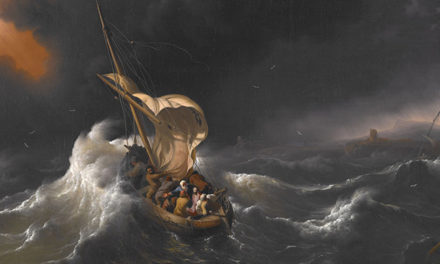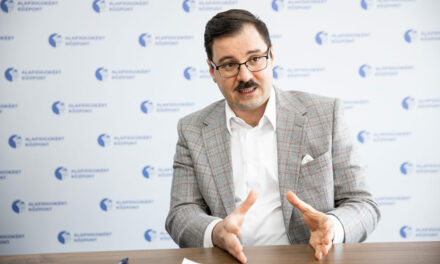Russians are land tigers, Americans are sea sharks; a conflict in the Middle East could be life-threatening for China. The stake is the maintenance of the US-controlled world order, but the more war there is, the more control slips out of his hands. New year geopolitical situation assessment with security policy expert Robert C. Castel.
How do you see the world at the beginning of 2024?
The mood of the world is determined by two regional wars: the one in Ukraine and the one in Gaza.
How normal is it for two local conflicts to determine the geopolitical mood of the entire world?
There have always been regional wars. The fact that their impact is now worldwide can be explained by globalization. Until the world was globalized, each region existed in its own little bubble, and wars were typically localized and affected narrower markets. Now, when all our everyday objects and tools are products of the global market, a local or regional war affects the entire system, thereby also affecting the price of the products we buy. Especially if the particular war affects an important production or trade center.
As members of Western civilization, don't we just feel that these two local wars define the whole world because of our own little bubble?
For China, for example, events in the Middle East pose a concrete mortal threat. If this war escalates, it will not only be a problem for the West, as China's trade and energy supply routes will also be threatened.
And in the global economy, all risks are built into the price of bread, smartphones and Netflix subscriptions.
In case of escalation, the risk increases, and because of this, everything becomes more expensive.
Are we talking about the same risks and effects?
Of course not. The 1973 oil crisis, for example, hit the United States with people queuing at gas stations, while people in Third World countries were starving. We have already had a small taste of the impact of the Russian-Ukrainian war on grain supply. If a regional war were to break out in the Middle East, it would endanger world trade, food shipments would drastically decrease, for example, a hunger riot would break out in Egypt, the government would fall, and there would be a revolution that could engulf the entire North African region or even the continent. This would cause a wave of migration, millions would leave, and the crisis would immediately reach the Balkans and then the rest of Europe.
Do you think globalization is the problem?
Globalization is a given, the current world order is based on it. Thanks to globalization, many more people can live on Earth today, and the economic system can feed and provide for significantly more people. Regional wars at important hubs, on the other hand, are ripping apart the fabric of globalization, leading to deaths and humanitarian disasters.
Yet in Europe, we are hearing about an existential war in the case of Ukraine: it must not be closed, but must be maintained until it is won...
Those are big words. There is no precise definition of existential war.
According to them, the war in Ukraine is not a matter of life?
The war in Ukraine is much more of a boutique war, a luxury that the West could afford. Until the war with Israel and the danger of escalation of regional war in the Middle East. In the shadow of a major war in the Middle East, the conflict in Ukraine became negligible.
We started from the point that both wars determine the mood of the world. What is the difference between the two?
The geographical space and the geographical impact. The Bretton Woods system and the related world order based on American dominance are based on free navigation on the seas. The essence of this is that the United States does not need to build and maintain a traditional world-wide empire, but can control it through economic dominance. In other words, I, the United States, guarantee you that without an empire, you can get cheap energy, you can sail freely, and in return you submit to me on many issues. According to this logic, the USA can feed its alliance systems with oil from the Middle East. If, on the other hand, it is unable to ensure free navigation, and thus cheap energy, then the foundations of the system, the pillars of the world order, will collapse. They are the pillars of the world order, which has held its own with minor changes since the Bretton Woods conference in 1944.
So the American effort is about maintaining this system?
In some ways, yes. There were minor modifications, for example at the end of the Cold War, but the logic is basically unchanged. Even now, the goal of the Americans is to secure the foundations, not to rebuild or build something new.
The US can let go of Ukraine, but it cannot let go of the Middle East.
Ukraine is a simple sphere of influence issue compared to the Middle East.
From Europe, however, the two wars seem equally important, perhaps the one in Ukraine even more important.
The reason for this is that Ukraine is closer to the European Union, and the Europeans, we Hungarians, think along the logic of land. Incidentally, this is also true for the Israelis. The Anglo-Saxon countries, on the other hand, create their strategies based on maritime logic.
From this also follows territorial-based strategic thinking, which many people now consider old-fashioned, even colonialist in spirit, and therefore outdated.
Territoriality does not mean simple square kilometers. There are significant differences in quality. The interior of Ukraine is not really important to the world. The Bosphorus, for example, can be said to be important, but in terms of importance it is dwarfed by the Suez Canal. We can think that today only the control of the idea and the virtual space matters, but man has one fundamental property, namely that he is a three-dimensional being. Virtual space can be lost if, for example, the power supply or the Internet is cut off. It is a concern, but not a matter of life. The loss of physical space, on the other hand, is a matter of life.
According to them, the Russians also think along the logic of land, at least for the purposes of their war.
Russians are land tigers, Americans are sea sharks.
And China?
China is also a land tiger. He cannot rule the sea. Only one great power can do that: the United States of America.
Living with a classic: the international situation is intensifying. Should America now prepare for another war?
The current world order has needed a really big, comprehensive reform until now: when the Soviet Union ceased to exist. Washington found himself in the dire situation of suddenly having no enemies. I had to find one quickly. The choice fell on Iraq and the Gulf War began.
But now there is no need to look for the enemy. Suddenly there are more. In fact, maybe too much.
There is indeed more, but it would not be too much if the USA managed its affairs wisely. Russia and China are at such a disadvantage that they shouldn't be a problem for him in the long run. The United States caused its own problems, essentially shooting itself in the head.
Looking for more enemies, but lost control?
A unipolar order has only rarely and temporarily occurred in world history.
We can also say that multipolarity is the normal state of the world.
The unipolar power of the United States was at its peak economically in 1945 and politically in 1991. After that, it gradually declined. This decline and the return to natural multipolarity could be slowed down and prolonged by smart management of geopolitics. In the case of Washington, however, this is not what we see now, he made bad decisions, which accelerated the process - perhaps temporarily, perhaps permanently. What we are experiencing now as geopolitical fluctuations are obvious signs of the process.
According to them, what we are seeing is not a tragedy?
What we define as a tragedy depends on our human perspective. If someone's dream is to have a huge transtoilet with solar panels in a deeply religious and traditional Middle Eastern state that all migrants can fit into, then it would be a tragedy for them if it doesn't happen. Due to the nature of the system, however, it is normal that this will not happen. What we see is also normal from the point of view of the world system, even if we experience it badly.
Let's return to the main topic of our conversation, the two wars. From the point of view of world order, is it clear which is more important?
In Ukraine, and even in Russia, you can shoot without any particular consequences.
Every bullet fired in the Middle East hits some important transport route, causing damage to the pillars of the world order.
According to them, it is possible to continue "shooting" in Ukraine...
If you have enough ammo. But there are not any. I don't think there's enough ammo, so waging war there is a waste. This could be seen before. This is an unnecessary conflict, an agreement could have been reached with the Russians a long time ago.
Certainly yes, but it is also a conflict about territories.
If I look at it from a geographical point of view, we are talking about a huge plain with no natural borders and protection. For this reason, from a strategic point of view, it does not matter where the border is drawn. Now I am not talking about economic interests. I know that a lot of people have been criticizing the Americans' purchase of land in Ukraine - perhaps rightfully so - but let's leave it at that. If I look at it based on a simple satellite image, it doesn't matter where the border is. I may be saying something terrible from the point of view of Poland or the Baltic states, but it could also be the Vistula from a purely geographical point of view. The balance of power between the West and the non-West does not change anything.
Geographically, perhaps, but culturally, it doesn't matter. And here I am thinking of the famous theory of Samuel P. Huntington and the limits of civilization. If I draw the line in the wrong place from a civilization point of view, it will sooner or later lead to war.
I think of it more like a map software in which we can plot layers. The first of these is the geographical basis. To this, it is advisable to add the demographic and then the civilizational layers to get a more accurate picture. But compared to geographical aspects, the other two can already change, and are therefore subjective. An objective thing, on the other hand, is a mountain range, a river or a gorge. The Strait of Hormuz has been unchanged for millions of years, while many demographic and civilizational changes have occurred around it. The fact that Romania does not belong to the Slavic world, but to the Western world, is the result of a momentary political constellation, since there were times when Romanians belonged to the Slavic world for religious reasons. So I would first look at the geographic picture, then the demographic picture, and only then can Huntington come.
However, the situation of the Ukrainians is explained quite well by Huntington's civilization fault line, which runs right inside the country.
I agree with that. But since there is no clear geographical boundary, Western civilization wants to push its borders as far east as possible, and Eastern civilization as far west as possible. The basic problem is caused by the geographical situation. The historical tragedy of Ukraine and Poland is that they are located in the area where the borders have been pushed for centuries. There are also constant conflicts in Africa, but the geography of the continent is such that no single power can control the whole of it, not even its larger regions.
After the geographical aspect, there is the demographic one. What can we see there?
From a demographic point of view, Ukraine and Russia follow each other like two fighter jets. Both were in a dive, but the Russian plane was pulled up earlier, thus gaining an advantage. Russia has a ninefold advantage in the current age group of 19-24 year olds. This explains why they went to war now: because they could. To this we can add the Huntingtonian reasons just mentioned, and the war is ready.
The European Union, on the other hand, hardly participates in geopolitics based on such considerations. We do not see an urge to end the war. Brussels is now trying with all its might to give new subsidies to the Ukrainians.
I see a huge danger in the division of labor that has developed in the European Union: the power is mine, the responsibility is yours. Brussels wants to make the decisions, but leaves the responsibility on the member states. It is easy to make decisions without bearing the consequences. If something goes wrong and Russia attacks the Baltic states, the bombs will not fall on Brussels, but on Tallinn, Riga, Vilnius. Brussels does not need to send soldiers because it has no soldiers. We can also approach the issue from the democracy side: Viktor Orbán could be voted out of power in five minutes if the voters wanted it, but not the Brussels bureaucrats. This is a great construction for the EU elite. He has incredible power without responsibility. You can make decisions without consequences for your decisions.
This is a strange and dangerous construct, a bad pattern that seems to be spreading in Western-style democracies. A postmodern idea.
In this regard, can postmodernism be good, the direction of development towards which everyone will go sooner or later, or is it rather a dead end?
Postmodernism is clearly bad. The goal of democracy is for those in power to exercise their power in such a way that the people they exercise it with agree to it. This is the essence of democracy, not various "rights" obtained from thin air, which even the constitutional judges had not heard of ten years ago. The essence of democracy is that voters should not feel that they cannot change things. And with this postmodern turn, we are undermining just that.
In China or Russia, decisions and responsibility are not so artificially separated from each other - even in dictatorships, power is not so separated from responsibility.
Vladimir Putin has power, but he also has responsibility. Ditto for the Chinese president. And this is also true for Volodymyr Zelensky. They know exactly that power and responsibility are connected. However, this is not the case in the European Union.
What does the issue of power and responsibility look like in the Middle East conflict?
The Middle East is full of "limited companies". One of them is Hamas. They think that political control and warfare are their business, but the people of Gaza are no longer their responsibility, they want to shift it to the international community.
Does this mean that Hamas is some kind of business?
Rather, it is one of the increasingly common political hybrid systems. It is like a state, it has territory, an army, and as long as things are going well, it takes care of the population. But when there is a problem, he immediately shifts the responsibility. Israel's goal is to dismantle this system, so that after Hamas, a group with real responsibility can take control. Another such hybrid is Hezbollah, which is a de facto state within another state.
According to some arguments, it was precisely because of the Israeli blockade and occupation that they could not build up the responsibility systems properly.
I often hear the argument that Gaza is like the Pest ghetto,
but I don't know that my grandfather had rockets, police, secret service in the Pest ghetto,
with which he would have continuously attacked the House of Loyalty.
A recurring argument about the war is that 1,200 Israelis died and more than 20,000 Palestinians - where is the proportionality here?
I think it's about not understanding the logic of war. Many may start from the laws on personal and proportionate self-defense situations and try to apply them to international relations. This is a huge mistake. When the Japanese sank American warships at Pearl Harbor in World War II, the American response was not to go to Japan and sink the same number of ships and kill the same number of Japanese. Or when the Hungarians tried to dislodge the enemy from the vicinity of the border in order to ward off the Mongol or Turkish danger, they were not guided by proportionality, but by the eradication of the danger. The same can be said about the intervention of the USA and its European allies in Afghanistan: it was not proportionate, but it was expedient. Don't be naive!
Does Israel want to rearrange the borders or the balance of power?
The political relations, so that a quasi-terrorist state is not your neighbor, but a more peaceful coexistence can be established.
Israel does not want to annex Gaza. Except for some extremists, the shooting range dog doesn't even need a Gaza...
The goal is to provide them with self-determination and self-management, but in such a way that it is not controlled by a terrorist group. Israel does not want to stay in Gaza, but it has not started the withdrawal either, as many people think. We are switching to a different fighting style.
At the end of our conversation, let's return to our starting point: is the world safer at the beginning of 2024 than a year ago?
The world is more dangerous and will become even more dangerous during 2024. Of the two regional wars, there can easily be three, of which the West can only win one, two of which can be tied at most. It is possible to win in the Middle East, but against Russia and China the match could only be drawn at best.
And if a third conflict can be avoided?
Even then, only the Middle East can be won, Russia cannot be defeated by the West. For the Russians, the situation is not urgent, the time pressure is more on the Americans, and it will get bigger and bigger the more the conflict.
Featured Image: Yoav Nir













